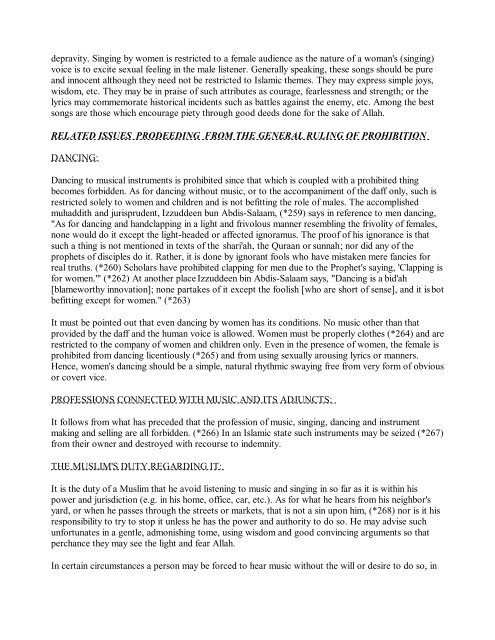The Islamic Ruling on Music and Singing - Enjoy Islam
The Islamic Ruling on Music and Singing - Enjoy Islam
The Islamic Ruling on Music and Singing - Enjoy Islam
Create successful ePaper yourself
Turn your PDF publications into a flip-book with our unique Google optimized e-Paper software.
depravity. <strong>Singing</strong> by women is restricted to a female audience as the nature of a woman's (singing)<br />
voice is to excite sexual feeling in the male listener. Generally speaking, these s<strong>on</strong>gs should be pure<br />
<strong>and</strong> innocent although they need not be restricted to <str<strong>on</strong>g><strong>Islam</strong>ic</str<strong>on</strong>g> themes. <str<strong>on</strong>g>The</str<strong>on</strong>g>y may express simple joys,<br />
wisdom, etc. <str<strong>on</strong>g>The</str<strong>on</strong>g>y may be in praise of such attributes as courage, fearlessness <strong>and</strong> strength; or the<br />
lyrics may commemorate historical incidents such as battles against the enemy, etc. Am<strong>on</strong>g the best<br />
s<strong>on</strong>gs are those which encourage piety through good deeds d<strong>on</strong>e for the sake of Allah.<br />
RELATED ISSUES PRODEEDING FROM THE GENERAL RULING OF PROHIBITION<br />
DANCING:<br />
Dancing to musical instruments is prohibited since that which is coupled with a prohibited thing<br />
becomes forbidden. As for dancing without music, or to the accompaniment of the daff <strong>on</strong>ly, such is<br />
restricted solely to women <strong>and</strong> children <strong>and</strong> is not befitting the role of males. <str<strong>on</strong>g>The</str<strong>on</strong>g> accomplished<br />
muhaddith <strong>and</strong> jurisprudent, Izzuddeen bun Abdis-Salaam, (*259) says in reference to men dancing,<br />
"As for dancing <strong>and</strong> h<strong>and</strong>clapping in a light <strong>and</strong> frivolous manner resembling the frivolity of females,<br />
n<strong>on</strong>e would do it except the light-headed or affected ignoramus. <str<strong>on</strong>g>The</str<strong>on</strong>g> proof of his ignorance is that<br />
such a thing is not menti<strong>on</strong>ed in texts of the shari'ah, the Quraan or sunnah; nor did any of the<br />
prophets of disciples do it. Rather, it is d<strong>on</strong>e by ignorant fools who have mistaken mere fancies for<br />
real truths. (*260) Scholars have prohibited clapping for men due to the Prophet's saying, 'Clapping is<br />
for women.'" (*262) At another place Izzuddeen bin Abdis-Salaam says, "Dancing is a bid'ah<br />
[blameworthy innovati<strong>on</strong>]; n<strong>on</strong>e partakes of it except the foolish [who are short of sense], <strong>and</strong> it is bot<br />
befitting except for women." (*263)<br />
It must be pointed out that even dancing by women has its c<strong>on</strong>diti<strong>on</strong>s. No music other than that<br />
provided by the daff <strong>and</strong> the human voice is allowed. Women must be properly clothes (*264) <strong>and</strong> are<br />
restricted to the company of women <strong>and</strong> children <strong>on</strong>ly. Even in the presence of women, the female is<br />
prohibited from dancing licentiously (*265) <strong>and</strong> from using sexually arousing lyrics or manners.<br />
Hence, women's dancing should be a simple, natural rhythmic swaying free from very form of obvious<br />
or covert vice.<br />
PROFESSIONS CONNECTED WITH MUSIC AND ITS ADJUNCTS:<br />
It follows from what has preceded that the professi<strong>on</strong> of music, singing, dancing <strong>and</strong> instrument<br />
making <strong>and</strong> selling are all forbidden. (*266) In an <str<strong>on</strong>g><strong>Islam</strong>ic</str<strong>on</strong>g> state such instruments may be seized (*267)<br />
from their owner <strong>and</strong> destroyed with recourse to indemnity.<br />
THE MUSLIM'S DUTY REGARDING IT:<br />
It is the duty of a Muslim that he avoid listening to music <strong>and</strong> singing in so far as it is within his<br />
power <strong>and</strong> jurisdicti<strong>on</strong> (e.g. in his home, office, car, etc.). As for what he hears from his neighbor's<br />
yard, or when he passes through the streets or markets, that is not a sin up<strong>on</strong> him, (*268) nor is it his<br />
resp<strong>on</strong>sibility to try to stop it unless he has the power <strong>and</strong> authority to do so. He may advise such<br />
unfortunates in a gentle, adm<strong>on</strong>ishing tome, using wisdom <strong>and</strong> good c<strong>on</strong>vincing arguments so that<br />
perchance they may see the light <strong>and</strong> fear Allah.<br />
In certain circumstances a pers<strong>on</strong> may be forced to hear music without the will or desire to do so, in

















